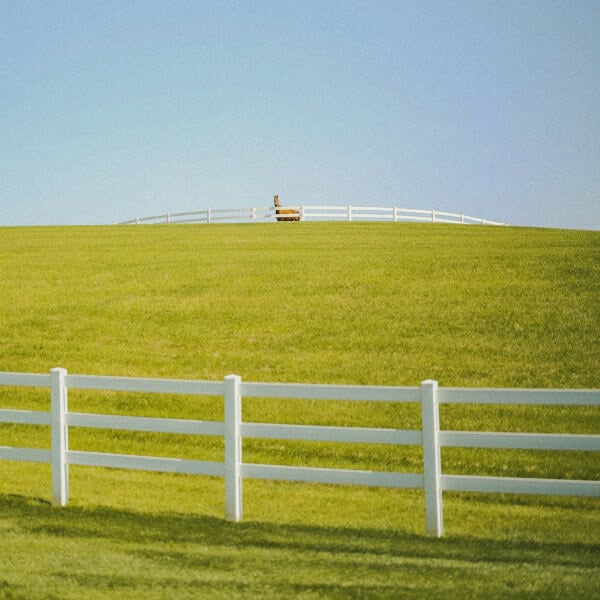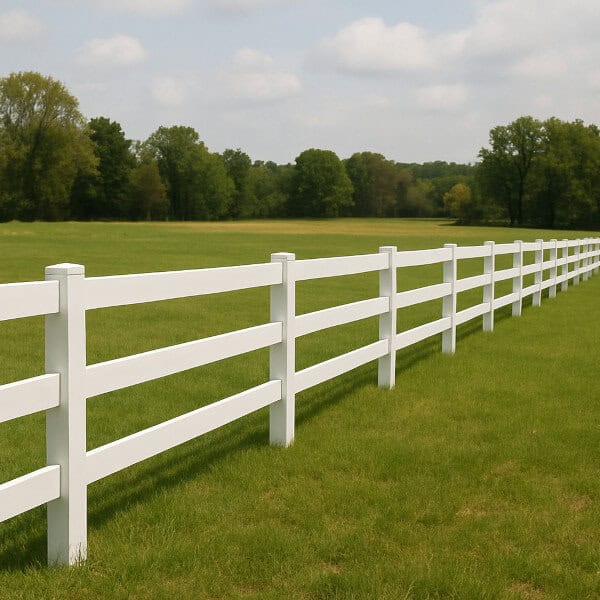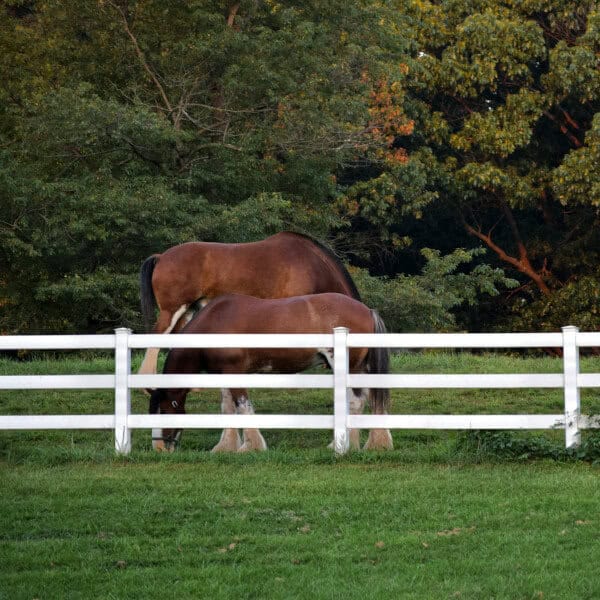We’ll explore the benefits and drawbacks of using vinyl fencing for horses, while also comparing it to traditional wood, metal, wire, and steel board fence options often used for farm and ranch fencing.
Vinyl fencing, often referred to as a PVC fence, is made from polyvinyl chloride, a strong synthetic material engineered for outdoor durability. Over the last few decades, vinyl horse fence systems have grown in popularity because they replicate the classic look of painted wood without the constant maintenance.
A vinyl ranch fence or vinyl farm fence is typically available in 2-, 3-, or 4-rail designs, closely resembling the iconic style of traditional wooden fencing. Unlike wood, though, vinyl is resistant to rot, splintering, and insect damage, which makes it especially appealing in agricultural and equestrian applications.
Key Benefits of Vinyl Fencing for Horses
1. Safety for Horses
Are vinyl fences safe for horses? Safety is the first priority when installing a vinyl fence for horses. Horses are large, powerful animals, and the wrong type of fencing can cause serious injuries.
- Smooth Surfaces: A vinyl horse fence has no splinters, nails, or rough edges, minimizing the risk of cuts or scrapes.
- Flexibility: Unlike rigid materials, vinyl fencing for horses has a degree of give. When a horse leans on it or bumps into it, the fence flexes slightly instead of snapping immediately, reducing the chance of injury.
- No Rust or Sharp Points: Unlike wire or metal fences, vinyl does not corrode or develop sharp edges over time.
2. Durability and Longevity
Vinyl farm fences are built to withstand the elements.
- Weather Resistance: PVC fence materials do not rot or warp like wood and are unaffected by moisture.
- UV Protection: Most modern vinyl horse fence products include UV inhibitors to prevent fading, cracking, and brittleness caused by sun exposure.
- Long Service Life: A well-installed vinyl ranch fence can last decades, providing long-term value compared to wood that may need frequent replacement.
3. Low Maintenance
One of the main reasons ranchers and farmers choose a vinyl fence is the reduced maintenance burden.
- No Painting or Staining: Vinyl horse fences retain their color for life, eliminating the need for seasonal painting or staining.
- Easy to Clean: A simple rinse with a hose or mild soap removes dirt, algae, or mud.
- Insect Resistant: Termites, carpenter ants, and other pests that destroy wooden fences have no effect on vinyl.
4. Aesthetic Appeal
Appearance matters on a horse farm or ranch, and vinyl delivers a clean, classic look.
- Variety of Styles: Vinyl ranch fences come in 2-rail, 3-rail, and 4-rail designs to suit different property layouts.
- Color Options: While white remains the most popular, vinyl farm fences are also available in black and other custom colors.
- Consistent Appearance: Unlike wood, which weathers and grays over time, vinyl maintains a uniform, polished look.
Applications of Vinyl Fencing
Vinyl fencing is versatile and can be installed in different agricultural and equestrian settings:
- Vinyl Ranch Fence: Provides a traditional ranch-style appearance while reducing long-term upkeep.
- Vinyl Farm Fence: A reliable solution for separating pastures, protecting crops, and improving property aesthetics.
- Vinyl Horse Fence: Specifically engineered for horse safety, making it one of the most trusted options in equestrian properties.
Environmental Impact of PVC Fence
Some horse owners wonder about the environmental impact of vinyl fencing. While PVC is a synthetic material, it offers some sustainability advantages:
- Recyclable Material: Many manufacturers now recycle old vinyl rails into new fence products.
- Non-Toxic: Unlike chemically treated wood, vinyl does not leach harmful chemicals into the soil.
- Reduced Resource Use: Because a vinyl horse fence lasts longer than wood, it reduces the demand for lumber and replacement materials over time.
While vinyl fencing offers many benefits, it is not without its limitations. Considering the drawbacks ensures you make an informed decision.
Higher Upfront Cost
When comparing vinyl fence vs steel board fence, it’s important to weigh safety, strength, longevity, and maintenance. Both options are widely used in equestrian facilities, but they serve different priorities.
Comparison Table for Vinyl Fence vs. Steel Fence
Side-by-side look at a vinyl fence for horses (PVC) versus a premium steel board horse fence.
| Criteria |
Vinyl Fence (PVC) |
Steel Board Fence |
| Primary Strength |
Moderate; rails flex and can crack under hard impact |
High; rail and post system resists direct impact and pressure |
| Horse Safety |
Smooth, no splinters; low abrasion risk |
Rounded profiles; flex-mounted rails absorb force to reduce injury risk |
| Containment Reliability |
Good for calm herds; rails may pop out or break if heavily leaned on |
Excellent; maintains rail integrity under leaning and crowding |
| Impact Behavior |
Rails can shatter in extreme cold or high impact |
Rails deform slightly and recover; far lower breakage rate |
| Maintenance |
Low; occasional wash; no paint/stain |
Very low; periodic inspection; powder-coat finish needs no painting |
| Longevity |
~20–30+ years depending on climate/UV |
~30–50+ years with galvanized, powder-coated components |
| Weather/UV Resistance |
Good; UV inhibitors help, but cold can increase brittleness |
Excellent; coatings resist UV, moisture, and temperature swings |
| Chew/Cribbing Resistance |
Better than wood; rails can still mark |
Excellent; steel rails deter chewing entirely |
| Appearance |
Clean, uniform; classic 2–4 rail look |
Crisp architectural lines; stays true/straight for decades |
| Repairability |
Broken rail usually replaced as a full piece |
Individual rail or bracket swap; repairs are infrequent |
| Upfront Cost |
Lower to mid |
Mid to higher (premium) |
| Total Cost of Ownership |
Low–moderate over time (potential rail replacements) |
Low over time (minimal maintenance, long service life) |
| Electric Offset Compatibility |
Non-conductive; accepts offset hot-wire easily |
Compatible with offsets using proper insulators |
| Environmental Considerations |
PVC is recyclable; no leaching like treated wood |
Steel is highly recyclable; long life reduces material turnover |
| Best Use Cases |
Decorative perimeters, calm herds, budget-sensitive installs |
High-traffic lanes, stallions/energetic herds, long-term investment |
For properties prioritizing ease of upkeep and a classic white rail look, a vinyl horse fence is a practical choice. For maximum containment strength, longevity, and safety under pressure, a steel board system is the premium solution.
Whether you need a vinyl ranch fence, a vinyl farm fence, or a pvc fence perimeter, we can help you evaluate loads, terrain, gates, and traffic patterns to determine where vinyl fencing for horses makes sense and where steel delivers the best return.
Vinyl Fence vs Steel Fence Verdict
A vinyl horse fence is an excellent option for safety, aesthetics, and low maintenance. However, for ranchers and horse owners who prioritize maximum strength, security, and longevity, a steel fence remains the premium choice.
Choosing the right horse fencing is a balance between safety, cost, appearance, and longevity. A vinyl horse fence offers significant benefits: safety, low maintenance, and long-term durability. For ranchers and farmers who want the look of traditional wood without the constant upkeep, vinyl fencing for horses is a practical solution.
However, for those with especially large or high-energy horses, or in regions with extreme climates, steel fencing may provide greater strength.
If you want a fence that combines beauty, safety, and ease of maintenance, a vinyl ranch fence or vinyl farm fence is an investment that enhances your property and ensures the well-being of your horses.







